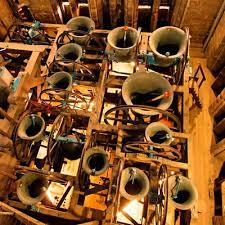Every week on BBC Radio 4, at about 05:43 on a Sunday morning and repeated on Monday at 00:45 a two-minute snippet of bellringing is aired. Ringing ranges from 5 to 12 bells and when possible is related to an event or date of importance. Clips for broadcast are selected from quite a limited BBC collection so over the years many recordings are repeated. It would be great to get some new recordings and particularly from towers that have never featured before.
This heatmap shows those towers in the UK who have featured previously (apologies to our international friends) so we can see what areas of the country hasn’t featured so far. International recordings have come from Washington DC, Adelaide, Notre Dame and Solovki Islands in the Artic Ocean.
Being able to get a recording of bells is now so much easier and here we’ve set out some guidance on how to get a good recording and submitting it:
- aim to record at least 10-15 minutes of ringing from which a 2-3 minute excerpt can be taken
- the ringing should have no major mistakes, we are looking to showcase our pursuit of excellence to the general public as well as ringers around the world
- ensure the band have agreed to submission of a recording of their ringing. Submitting a recording shall be taken as implicit permission to use the recording for Bells on Sunday and also subsequently by the bell ringing community
- try to find a position to record the bells that is normally quiet, e.g. not next to a busy road/railway/flight path. Or plan the recording for a known quiet time, or wait for the area to become quiet
- avoid background conversation and noise at all times that includes birdsong
- choose a day that isn’t windy or rainy to record
- ideally use a stand to keep the microphone as still as possible (we often hear microphone handling noise on recordings sent to us)
- stand about 10-15 metres away from the tower and point the microphone about halfway up the tower; that should produce a good sound. If this sounds muffled try pointing higher up the tower, if too tinny, try lower down or angling the microphone away
- uncompressed 16 or 24 bit stereo recordings in .wav format are preferred; but mp3 and mono recordings are also acceptable.
Submitting a recording
A recording should be supplied via googledrive or dropbox or similar file transfer mechanism, contact for details and small files (25Mb or less) can be emailed direct.
If you want to post a CD then email Phillip for address details. He will review the recording quality and advise if the BBC will accept it to be broadcast.
Supply details of location (dedication etc.) Founder(s) and year, Tenor weight, method(s), etc., etc. A little history, that sort of thing. Note that as the broadcast slot is sadly very short we may have to edit the wording. It is definitely worth having a look at a few previous recordings on the BBC BOS website for an idea of the format. https://www.bbc.co.uk/programmes/b006sgsh
Broadcast for a special event
If you have a particular Sunday (well in advance) that you would like to have your recording broadcast please let Phillip know (800th anniversary of the building of the tower, that sort of thing), no guarantee but he will do his best to plead your case for a particular date.
The BBC prepare their schedule for broadcast about one month ahead. New recordings are run through with the programme production team. When a recording is submitted Phillip is able to recommend a broadcast start point.
Please make sure you allow plenty of time for your recording to be reviewed and made ready, particularly if you want it to air on a specific date. If you have any questions please contact
We look forward to hearing some new recordings.
Send to a friend
